- Home
- Shirlee McCoy
Home with You Page 8
Home with You Read online
Page 8
“What are the doctors saying?” she asked, falling into step beside him as he walked back to the cafeteria.
“That if she survives, she probably won’t be the same. There’s some damage to the frontal lobe of the brain. The surgeon mentioned a dozen things that could impact. I got the impression that she wasn’t very hopeful for any kind of recovery.”
“The surgeon is one person with one opinion,” she reminded him.
“It’s not just the surgeon. It’s the attending physician, the neurologists, the nurses. Sunday has been in a coma since the accident. The longer it goes on, the less hope for a full recovery. That’s a fact. Not an opinion.”
“Here are a few other facts. The human body has an incredible capacity to heal. Doctors don’t know everything. Nurses don’t, either.”
“Yeah. I know.”
“But?”
“Someone has to decide how far treatment should go, how much disability Sunday would want to live with. My brothers and I have medical power of attorney. If it comes down to it, we decide whether to keep Sunday on life support or take her off it.”
“That’s tough,” she said, feeling herself being pulled into his story, into his life and drama. She didn’t want to be. She wanted to say good-bye and walk away, maybe hitchhike through the storm until she found her way back to the homestead. Anything but stand there listening to the depth and width and volume of the tragedy he was going through.
“I think she’d want to be here for the kids. No matter what.” He grabbed an insulated cup from a cafeteria counter and poured coffee into it. “Want a cup?”
“No. Thanks. I need to get going.” There. She’d said what she should, given herself the out she needed.
“Your ride is on the way?”
“No,” she admitted before she realized the mistake.
He poured a second cup of coffee, dumped in two packets of sugar and three creamers, and handed it to her. “Might as well drink the coffee, then. If your ride is coming from anywhere outside of Spokane, it’s going to take a long time to get here.”
She peered into the cup, eyeing the light-brown brew. Somehow, he’d made it exactly the way she would have. Two sugars. Three creams.
“I’ll probably wait in the lobby,” she murmured.
“Too much drama?” he asked, taking a sip of coffee and watching her over the brim of his cup.
“It’s not drama. It’s real-life tragedy, and you’ve got way more on your plate than anyone should. It will be easier for you to deal with everything if you don’t have an extra person underfoot.” That sounded reasonable. It sounded professional.
It sounded exactly like the excuse it was.
“We met because you were responding to a help-wanted ad. The help-wanted ad was in the paper because I needed help. Help is not another person underfoot.” He took another sip of coffee, grabbed two prepackaged pastries from a basket, and walked to the long line that stretched out from the only open cash register. “But, I’m sure you know that, so I’ll take this conversation to mean you’re no longer interested in the job.”
He sounded so weary, so defeated, she didn’t have the heart to say that it did. “I’m sure you’d rather find someone who doesn’t have other obligations.”
“Rumer, I’m desperate enough to take Bozo the Clown if he shows up on my doorstep. You’ve seen what those kids are like. They’re—”
“Wonderful?”
He smiled, a slow, easy smile that softened all his sharp angles and hard edges. He looked sweet. The kind of guy Rumer would be happy to do a favor for.
Which, of course, meant nothing.
She was a Truehart.
Truehart women had notoriously bad luck when it came to knowing the good guys from the bad ones.
“See? That is exactly why I want to offer you the job.”
“Sullivan—”
“I’ll pay you what I quoted earlier. Plus, an extra thousand dollars a week if you accept my offer now.”
That would pay off Lu’s bills and cushion her account. She’d be able to feed the horses, pay to have the alfalfa planted, hire some weekend help. Get things back on track with the nonprofit. No stress. No fuss. Just Rumer taking care of six kids and a house for the next couple of months.
It was an offer almost too good to refuse.
And, he knew it.
Darn it all!
She could see the calculation in his eyes. He might be grief-stricken and struggling, but he sure as heck knew how to get what he wanted. “That’s an awful lot of money, Sullivan.”
“To take care of an awful lot of problems. Six to be exact. Plus cooking. Housework.” He shrugged. “It seems fair.”
“I’d really need to take some time to think about it.”
“The thousand dollars extra is a bonus for not thinking about it. Or, at least, not thinking about it any more than you did this morning when you donned that yellow suit and drove to Pleasant Valley Farm. I could have been anyone on the other side of that ad. You took a chance then. The only thing different now is that you’ve met me and the kids.”
He was right.
She’d driven to his place with absolutely no idea of what she’d find. For all she’d known, she was going to knock on the door of a serial killer. “I—”
His cell phone rang, and he frowned, trying to balance the coffee and pastries in one hand while he dragged it from his pocket.
She took the coffee and waited while he answered the phone.
It would have been easy enough to leave if he hadn’t offered so much money and if he didn’t look frazzled and concerned, the phone pressed to his ear, the pastries being crushed in his hand.
He didn’t say much. Just listened. Then nodded, cleared his throat, grunted out, “Yes.”
“I need to go up to surgery. Can you pay for this?” He dug a twenty out of his wallet, shoved it and the pastries toward her, his knuckles brushing her abdomen as he rushed to get everything out of his hands.
Coffee sloshed on the floor and on the sleeve of her coat. They were making a royal mess of the cafeteria, but he didn’t seem to notice or to care. He was already running toward the door, sprinting into the hall and disappearing from view.
Which left her in the line with too many things in her hands.
Coffee dripping from her arm.
Twenty dollars crushed in her fist.
Not sure what was happening, but certain it wasn’t good.
She felt sick with worry over a woman she didn’t know, over a family she’d just met, and she couldn’t stop picturing little Moisey, marching down the middle of the road in her boots and tutu.
What would happen to her if her mother didn’t return?
What would happen to Heavenly, Twila, the twins, and Oya?
Would their uncles step up or step away?
And, why was she wondering when it really wasn’t any of her business?
“It isn’t,” she told herself just to emphasize the point.
“Isn’t what?” a man responded.
She glanced back, realized an older gentleman was in line behind her. Medium height, gray hair, eyes filled with amusement, he was holding a cup of coffee and a giant pink bear.
“My business,” she answered mostly because she liked the twinkle in his eyes.
“Ah. So, you’re thinking about making it your business.”
“Absolutely not.”
He snorted.
“I’m not.”
“And, I’m not here to visit my granddaughter and her new baby.”
“Are you?”
“Of course.” He held the bear up so she could get a good look. “Another little girl. This is my second great-granddaughter.”
“Congratulations.” She smiled, and he seemed to take that as an invitation to continue.
“Thank you. I’m hoping for a few more.”
“Great-granddaughters?”
“Great-grandchildren. Girls or boys. I’ve got no preference. I figure nine would be
a good number. Three from each of my granddaughters.”
“Are they aware of this?”
“You’re damn right they are! I’ve made it very clear that one of them has to produce the heir to my chocolate empire.”
“You have a chocolate empire?”
“Some people would call it a chocolate shop. Me? I say it’s an empire. Chocolate Haven has been around for more years than the two of us combined.”
“Is it here in Spokane? My grandmother loves good chocolate,” she said, happy to continue the conversation. Lu did love chocolate. Rumer loved people who had twinkles in their eyes, smiles on their faces, and stories to tell.
“Nah. Chocolate Haven is in Benevolence. Ever heard of it?”
“I have. It’s just to the east of where I grew up.”
“And, you’ve never tried my chocolate? Now, you listen.” He reached into his pocket and pulled out a wallet. “I’m giving you my business card. You go to Chocolate Haven next time you’re near Benevolence. Someone there will hook you up with a pound of the best fudge you’ve ever eaten. On the house. Just tell whoever is there that Byron sent you.”
He dropped the card into her purse and grinned.
“It’s nice to meet you, Byron,” she said, setting the pastries down near the cash register and paying the cashier. “I’m Rumer. Maybe we’ll see each other at your chocolate shop one day.”
She was already moving away, the two cups of coffee in her hands, the pastries in her purse, Sullivan’s change in her pocket.
“That’s an unusual name, kid. You wouldn’t happen to be Rumer Truehart, would you?” Byron called as she headed toward the exit.
Surprised, she stopped and turned to face him again. “That’s right. Have we met?”
“I know your grandmother. Lu. She’s come into Chocolate Haven every few months since she was a kid. Gets herself a pound of s’more fudge and leaves. Not much for talking, that one.”
“No. She’s not,” she said, surprised to meet someone who’d known Lu when she was young. There were no photos of Lu as a child, no class pictures or yearbooks. Nothing that anchored her in time. It had always seemed to Rumer that Lu had been born a crotchety old woman with a big heart, that she’d never been a child or a young woman with dreams.
Of course, she obviously had been all those things, but the past had been off-limits in their conversations. Lu liked to deal in the here and now. She hated waltzing down memory lane. Her words. Not Rumer’s.
“She does talk about you, though. Says you’re the best of the Truehart bunch.”
“That doesn’t sound like Lu.” She wasn’t one for effusive praise. She said it like it was and didn’t bother stroking egos. Ever. Bragging? That was about as likely as Lu going to the casino to gamble away her hard-earned cash.
“God as my witness. She says it every time I ask about her family. How is she? It’s been a while since I’ve seen her.”
“She had some heart problems. She’s recovering. We’re hoping she’ll be one-hundred percent soon.”
“I’m sorry to hear that. What room? Maybe I’ll pop in for a visit after I deliver the bear and chocolate.”
“Lu’s already home. I’m here with someone else.” They were moving down the hall, talking like old friends. He was obviously going up to the maternity ward. Rumer had no idea where she was heading.
Not to the surgical unit, because that would be a mistake. She didn’t think she could spend much more time with Sullivan and still manage to walk away. She didn’t think she could look into his tired face, listen to him talk about his sister-in-law, watch as he grieved, and still refuse the job.
Plus . . .
The money.
Yeah.
That was a big deal.
One that she could only discount if she could convince herself that the offer wasn’t valid, that maybe he was reeling her in and then planned to renege on the agreement. She did, after all, have a terrible record when it came to putting her trust in the wrong people.
Look at Jake.
She’d believed every lie he’d told her until the evidence of his infidelity was right in front of her face. Even then—even looking at the silky thong tangled in the sheets of their bed—she’d tried to believe something other than what she was seeing. She was a Truehart woman, after all.
“Well tell her I said hi. I’ve missed seeing her. How’s Minnie?” Byron said, pulling her from memories she shouldn’t be dwelling on.
“Same as ever.”
“I heard she’s got some kind of doctoring business. One of the ladies from church goes to see her.”
“She’s a naturopath.”
“That’s a fancy word for a doctor who doesn’t like to give traditional medicine, right?”
“Something like that.” They’d reached the bank of elevators and he jabbed one of the buttons. “What floor?” he asked as they stepped inside.
“Four,” she responded, because the truth was, she had Sullivan’s coffee, his pastries, and his change. She also had a need to know what was going on and a deep desire to make all that extra money.
“Surgical unit is up there. You got a loved one going under the knife?”
“A . . . friend of mine does.” That was the easiest explanation. “He asked me to take care of his kids while she’s in surgery and recovering.”
“I hate to tell you this, but you’re doing a piss-poor job of it. Near as I can tell, you don’t have a kid anywhere near you.” He smiled, and she grinned.
She might be allowing herself to be pulled into more trouble than any one person needed, but at least she was meeting interesting people along the way!
“They went home with their pastor. They live just outside of Benevolence, and with the roads getting bad, it seemed best for them to head home.”
“My daughter-in-law would tell me not to point this out, but I can’t help myself—if you’re watching the kids, wouldn’t it make sense for you to go home with them?”
“It’s complicated.”
“Life is complicated. That’s what makes it interesting.” He winked, and she couldn’t help herself. She laughed.
“You’re right about that. The fact of the matter is, I don’t know the person having surgery. I don’t know the family. I don’t know the kids. This morning, I was looking for a job, hoping to make money to help Lu with her medical bills. I drove out to an organic farm and planned to interview with a guy who advertised for a housekeeper and cook. Somehow, I ended up here.”
His eyes narrowed, and he cocked his head to the side, studying her like she was a bug under a microscope. “Organic farm? Are you talking about Sunday Bradshaw’s place?”
“That’s right.”
“The ad ran in the Benevolence Times this morning. Saw it myself and wondered who would be foolish enough to take on the task.” He must have realized what he said, because his cheeks flushed and he shook his head. “What I mean is—”
“You don’t have to explain. I’ve been asking myself the same question since I walked into the farmhouse and saw the . . . need for help.”
“The mess, you mean? The way I hear things, Sullivan is struggling trying to get it all done.” The elevator doors slid open, and he should have stepped out. Instead, he stood on the threshold. “I didn’t realize Sunday needed another surgery.”
“I got the impression it was unexpected.”
“Well, it’s not unexpected now. Now, it’s known. Obviously, the need for help is even greater during a time like this.”
It wasn’t a question, but she found herself nodding in agreement.
“Here’s what we’re going to do. You go on up and tell Sullivan that help is on the way.”
“I don’t think—”
“I’ll make a few phone calls, and we’ll have an entire contingent of people up here waiting with him.”
“I don’t think he needs anyone to wait with him.”
Too late.
He’d already stepped off the elevator.
* * *
Byron Lamont made fudge, chocolates, and candies that Sullivan had dreamed about and drooled over when he was a kid. He also owned the longest-lived shop in Benevolence, Washington. Fifty or so years after taking over from his father, he was still running the shop and making a profit. By all accounts, he was a great chocolatier, a savvy businessman, and a good friend.
And, he was currently sitting beside Sullivan in the waiting room, asking Rumer dozens of questions she seemed more than willing to answer.
How old was she?
Where had she attended college?
What degree did she have? What kind of job? Was she married? Dating? Engaged? Did she have any kids?
If Sullivan had been the subject of the interrogation, he’d have put a stop to it twenty minutes ago, but Rumer was going with the flow, allowing Byron to ask as many questions as he wanted.
He seemed to want to ask a lot.
Sullivan gave Rumer points for patience. It was a good quality to have. One that he was running very low on. He wasn’t meant to be a parent. He’d known that before he’d been old enough to have kids. He’d listened to his father rant and rave, and he’d realized how easy it might be for anyone to become that person. The one who’d brought kids into the world, but didn’t want anything to do with them. The one who was more judgmental than understanding, more harsh than gentle, more hate-filled than loving.
Of course, his father hadn’t just been harsh, judgmental, or hateful. He’d been purposely cruel to his kids and to his wife. He’d taken everything that was given to him and demanded more. The way he’d viewed things, it had been his right as the head of the home to have what he wanted when he wanted it. When he didn’t get that, he flew off the handle, breaking whatever he could get his hands on. Including his wife’s wrist, her nose, and her heart.
She’d been in a terrible marriage, but she’d managed to be a loving and compassionate mother. Sullivan remembered that. Just like he remembered that she’d been their protector until she died of cancer, putting herself in the crosshairs of her husband’s anger to keep her children from being harmed. It wasn’t long after she died that his father had turned his rage on the four kids she’d left behind. Sullivan had been punched, kicked, and pushed down a flight of stairs. His brothers had been treated similarly. None of them had asked for help from the community. None of them had believed they’d get it. Their mother’s silence had become theirs.

 Home at Last
Home at Last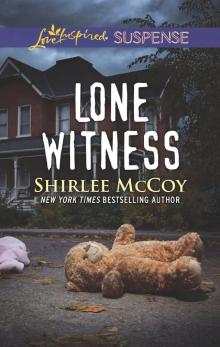 Lone Witness
Lone Witness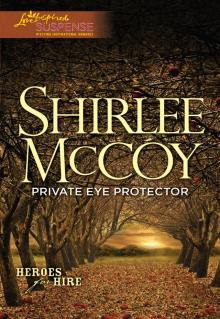 Private Eye Protector
Private Eye Protector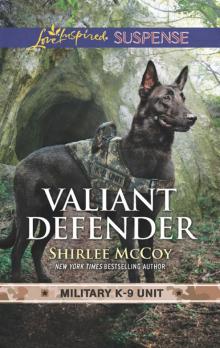 Valiant Defender
Valiant Defender Running Scared
Running Scared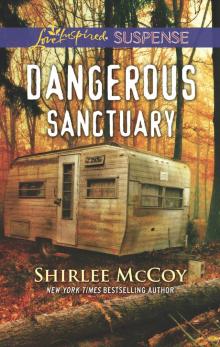 Dangerous Sanctuary
Dangerous Sanctuary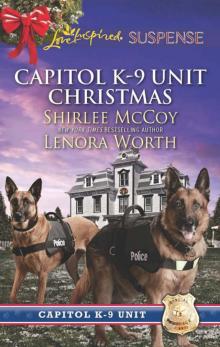 Capitol K-9 Unit Christmas: Protecting VirginiaGuarding Abigail
Capitol K-9 Unit Christmas: Protecting VirginiaGuarding Abigail Hidden Witness
Hidden Witness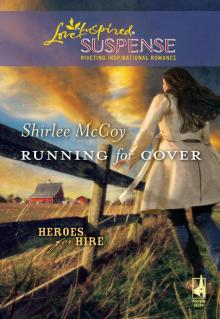 Running for Cover
Running for Cover Gone
Gone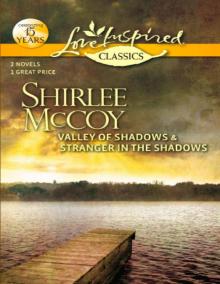 Valley of Shadows and Stranger in the Shadows: Valley of ShadowsStranger in the Shadows
Valley of Shadows and Stranger in the Shadows: Valley of ShadowsStranger in the Shadows Home with You
Home with You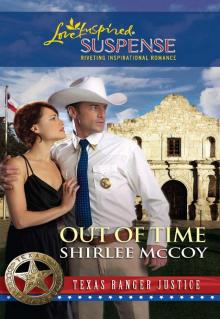 Out of Time
Out of Time Deadly Christmas Secrets
Deadly Christmas Secrets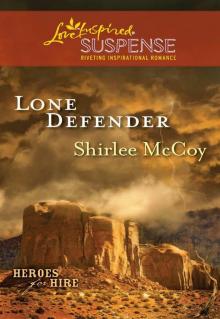 Lone Defender (Love Inspired Suspense)
Lone Defender (Love Inspired Suspense)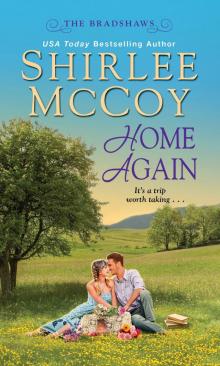 Home Again
Home Again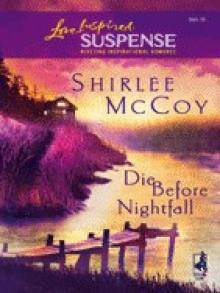 Die Before Nightfall
Die Before Nightfall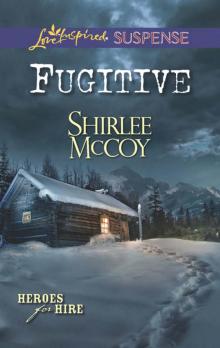 Fugitive
Fugitive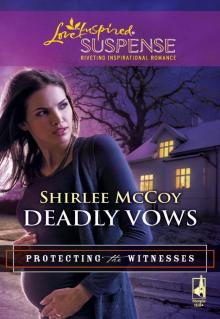 Deadly Vows
Deadly Vows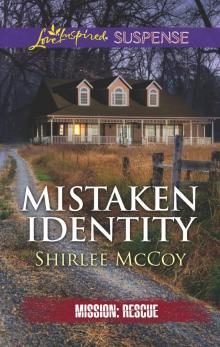 Mistaken Identity
Mistaken Identity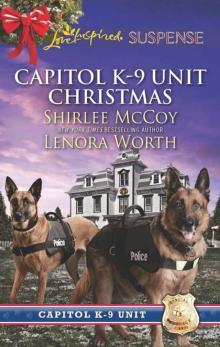 Capitol K-9 Unit Christmas
Capitol K-9 Unit Christmas The Christmas Target
The Christmas Target SB01 - The Guardian's Mission
SB01 - The Guardian's Mission Sweet Surprises
Sweet Surprises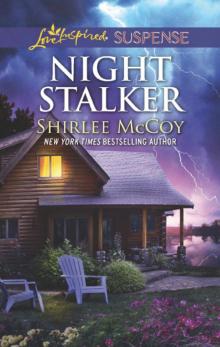 Night Stalker
Night Stalker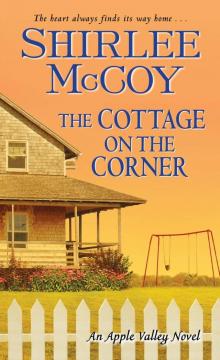 The Cottage on the Corner
The Cottage on the Corner Love Inspired Suspense January 2014
Love Inspired Suspense January 2014 0373447477 (R)
0373447477 (R) Love Inspired Suspense March 2015 - Box Set 1 of 2: Protection DetailHidden AgendaBroken Silence
Love Inspired Suspense March 2015 - Box Set 1 of 2: Protection DetailHidden AgendaBroken Silence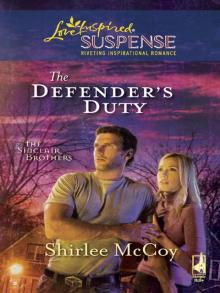 SB03 - The Defender's Duty
SB03 - The Defender's Duty Love Inspired Suspense June 2015 - Box Set 2 of 2: Exit StrategyPaybackCovert Justice
Love Inspired Suspense June 2015 - Box Set 2 of 2: Exit StrategyPaybackCovert Justice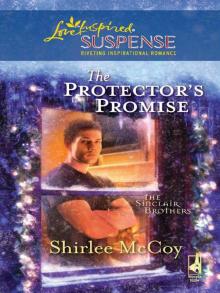 The Protector's Promise (The Sinclair Brothers)
The Protector's Promise (The Sinclair Brothers) Bodyguard
Bodyguard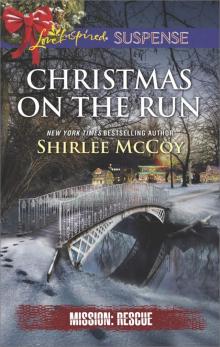 Christmas on the Run
Christmas on the Run The Orchard at the Edge of Town
The Orchard at the Edge of Town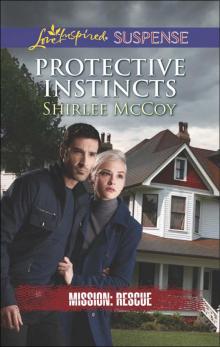 Protective Instincts
Protective Instincts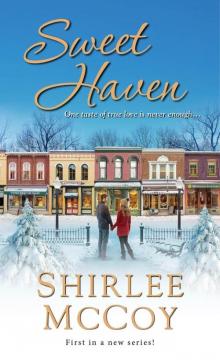 Sweet Haven
Sweet Haven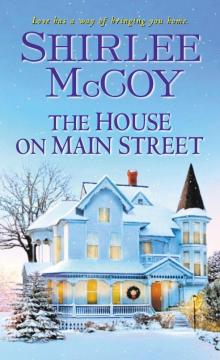 The House on Main Street
The House on Main Street Her Christmas Guardian
Her Christmas Guardian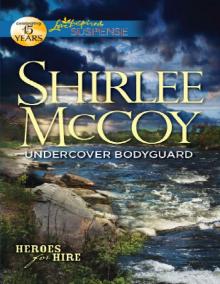 Undercover Bodyguard
Undercover Bodyguard